Who cares for the carer when they're bereaved?
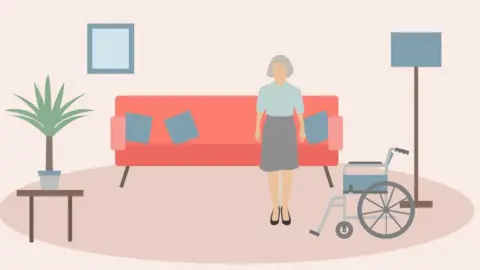 BBC
BBCThere are 6.5 million people in the UK caring for sick loved ones. But when their relative dies, the support network often disappears - dealing a double blow to those not only bereaved but who have lost their identity as a carer too. What is it like for them to grieve both?
"When you say your vows, in sickness and in health, you think you know what it means. But until it happens to you, you don't."
Helen, not her real name, cared for her husband David for 17 years after he had a stroke in 1995. A former nurse, she gave him round-the-clock care until his death.
"I used to feel resentment sometimes. I'd take him to the doctor and it would be about making sure David was OK, which was so important.
"But sometimes I'd sit there and think, 'what about the carer, what about me and how I feel?'"
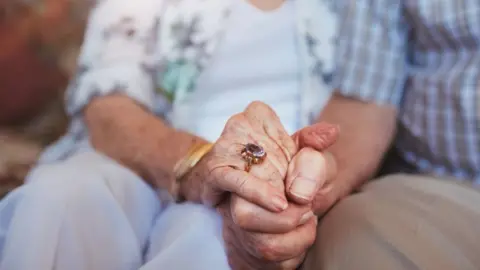 Getty Images
Getty ImagesThe 84-year-old said she did everything to help David, who would ring a bell when he needed her. She would take him to the toilet, provide his meals and his medication.
When he died in 2012, Helen said her "two wonderful daughters" stayed with her for a while, but eventually she "just wanted to be on her own" to get used to being in the house without her husband of 50 years.
"There's a void, when that person you're caring for dies. A huge void which leaves you completely isolated," she said.
"Many of my friends who have gone through this too have fallen into it, the black hole that is left behind.
"I've pulled myself up and just got on with it. It's sink or swim."
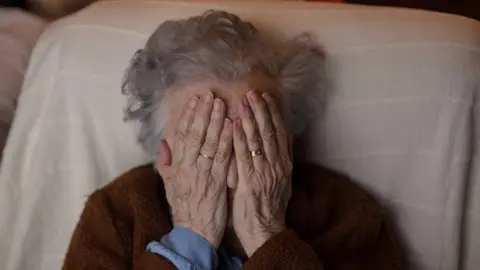 Getty Images
Getty ImagesThe Department of Health and Social Care says there are millions of registered carers in the UK.
Many receive government support, including Carers Allowance, Carers Credit, tax credits and other benefits, but this often ceases when the cared-for person dies.
Elizabeth, who lost her husband in 2014, sought help from Caring with Confidence - group sessions which she described as a "lifeline".
"I was determined to do everything for Phillip when he was alive. To keep that confidence after he had died, that's another story.
"It's like all the time they're alive, you are secondary in the pecking order. You don't question it, because you love them so much.
"No-one tells you how hard that is going to be afterwards. You try and put yourself at the top again, but it doesn't quite feel natural.
"So you fill your life with other ways to help people, to still care. The only thing that worked was getting out there. It took a lot to do that."

You might also be interested in

Caring with Confidence was launched in 2009 as part of the government's "New Deal for Carers" programme, but funding was cut a year later.
Monthly meetings are now held in Solihull, Shropshire, Wolverhampton and Dudley in the West Midlands and South Warwickshire, run voluntarily by the Omega Care for life charity.
"The best thing we did was go out and find support," said Helen, who also attends the sessions.
"That's the first thing you learn as a carer, and the thing that stays with you when the person you've been caring for has gone.
"No one is going to do it for you. So you better pull yourself up by the bootstraps and carry on."
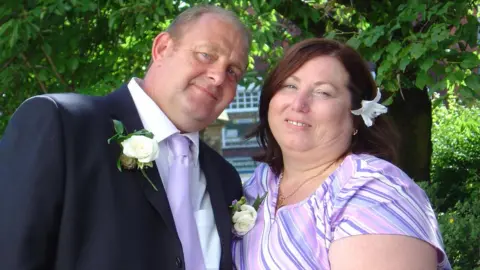 Bob Hasketh
Bob HaskethBob Hasketh knows all too well the importance of asking for help.
The 62-year-old from Bilston in the West Midlands has been a carer twice - first for his late wife Jean, who died in 2009 and his father William, who died five years later.
His wife had struggled with mobility issues since tripping over the pet dog in 1998 and had often used a wheelchair with Bob's help.
Shortly before her death she contracted a rare kidney infection and her husband of 30 years had to make the difficult decision to turn off her life support.
Struggling to cope with the grief, he considered suicide.
"I told the doctor and asked for some pills. He refused to give me any medication and instead got me referred to a psychiatrist.
"The psychiatrist really helped me focus on what I enjoyed doing, so I threw myself into working on my garden, and it didn't give me time to feel sorry for myself."
'Don't go through it alone'
It was a technique Bob employed again when his father died.
"I think going through a bereavement as a carer, and as a man, is different because men are less likely to talk about things or ask for help. If I hadn't have gone to the doctors when I did, I genuinely believe I wouldn't be here now.
"And so that's what I'd say to anyone going through bereavement as a carer - reach out, go to the doctors, speak to someone.
"Because people just expect you to get on with it, but I know what it's like. Don't think that you have to go through it on your own."
Independent Age has recently published a report on bereavement which looks at what the death of a cared-for person means to the carer - from loneliness and isolation, to mental and physical health, financial and practical considerations, and grief.
"Carers often go through anticipatory grief while the person they are caring for is still alive, and further grief after they have passed away," said head of policy and campaigns, Ray Mitchell.
"This requires a particular kind of support that we do not think the government currently adequately provides."
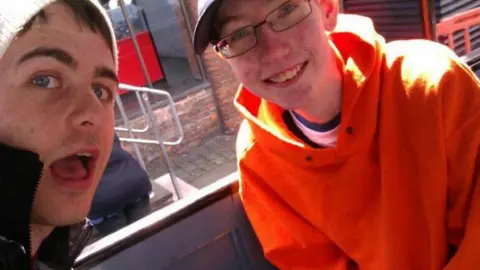 Josh Fletcher
Josh FletcherFor Joshua Fletcher, grief came in stages after he lost his 16-year-old brother Harry to a rare liver cancer.
The 28-year-old psychotherapist from Manchester was left with a "maelstrom of emotions" - from limbo to freedom and later, anxiety.
"My life had revolved around Harry, as had my mum's. I was relieved for him. But I saw my whole life through a new lens. My dad died a year later as well, and the trauma of what happened to Harry came flooding back.
"Looking back, I can see how I was experiencing grief. That feeling in the jaw, in my sternum. The experiences I had brought out an anxiety disorder. I was off work for a month.
"I'd say to anyone going through a similar scenario, accept those emotions for what they are, whether they're guilt, joy at the freedom, or a deep sadness and desperation. It is heartbreaking, but whatever those feelings are, give yourself time and space to feel them."
Carers Week, which runs from 11 June, aims to raise awareness of how carers deal with losing a loved one.
Emily Holzhausen, director of policy and public affairs at Carers UK, said: "This year [we are] focusing on how carers can be supported to look after their health and wellbeing and stay connected.
"Caring can feel all-consuming, making it hard to maintain relationships with others and look after your own health needs.
"This means that too many carers end up socially isolated, at risk of loneliness and in poor health. When bereavement brings an end to a caring role, this change in identity and purpose can feel like a double loss."
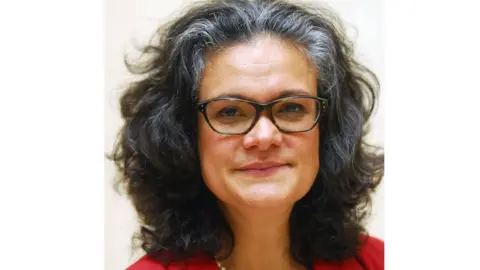 Carers UK
Carers UKThe government said in its recently published Carers Action Plan it would take action to help recently bereaved carers.
It said it did not know how many carers were bereaved but said they "must be a priority too" and the plan would look at more ways of offering help.
A spokeswoman added that "people affected by a death should have access to support", but said this varied from region to region.
Jane Hunt, from Omega, said there were no "quick fixes" for carers dealing with grief, but regular group sessions could help.
Certainly for Helen, joining the charity's support session was "the best thing" she did following David's death.
"People don't really know what to say when that person dies, they think it's a blessing for you, as if you're finally free. But it's not like that.
"That's why Elizabeth and I still go to the carers group, because being a carer stays with you. It never goes away."
Help and advice for carers and those coping with bereavement is available at the BBC support pages.
